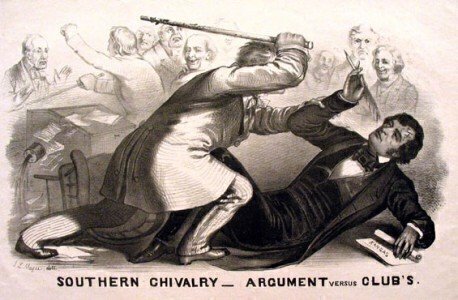A nearly fatal beating on the U.S. senate floor on this day in 1856 was another step toward a Civil War five years later. But the attacker wasn’t an assassin—he was a fellow elected representative.
 On May 22, 1856, Representative Preston Brooks attacked Senator Charles Sumner with a metal-tipped cane, leaving Sumner seriously injured. Brooks received a $300 fine.
On May 22, 1856, Representative Preston Brooks attacked Senator Charles Sumner with a metal-tipped cane, leaving Sumner seriously injured. Brooks received a $300 fine.
The incident started when Senator Sumner, an abolitionist from Massachusetts, gave a two-day speech on the Senate floor after an incident in Kansas. During his speech, Sumner made fun of Brooks’ relative, Senator Andrew Butler of South Carolina, who had suffered from a stroke, and he used language that compared the South’s use of slavery to prostitution.
During Sumner’s speech, Senator Stephen Douglas told a colleague, “That damn fool will get himself killed by some other damn fool.”
Brooks had a history of violence—he used the cane because he was hurt in a political duel in 1840.
An irate Representative Brooks sought advice from fellow South Carolina Representative Laurence M. Keitt, who talked Brooks out of a duel, because he believed Sumner wasn’t worthy of the honor.
Instead, Brooks confronted Sumner on a nearly empty Senate floor, as Sumner was stamping copies of his "Crime Against Kansas" speech.
Brooks beat the defenseless Sumner to a pulp as Keitt stood by with a drawn gun.
The incident made heroes of both men in the Northern and Southern press. The New York Times sent a champion bare-knuckles boxer to cover Congress as a reporter. Admirers in the South mailed canes to Brooks and held banquets in his honor.
“We are rejoiced. The only regret we feel is that Mr. Brooks did not employ a slave whip instead of a stick,” said the Richmond (Virginia) Whig, echoing the sentiments of some Southern newspapers.
Sumner survived the attack, but he didn’t return to the Senate for three years. His desk remained empty as a symbol of a divided nation. After his return in 1860, Sumner served in the Senate until his death in 1874.
Brooks was later challenged to a duel by another politician, but backed out at the last moment. Brooks died in 1857 from the croup, after he had been expelled from the House and then re-elected.







